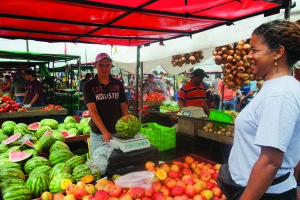Health risks increase with grocery store distance


 So what’s a food desert? According to the Florida Department of Agriculture, a food desert describes communities where the nearest full-scale grocery store is located at least a mile away from a household in an urban area such as St. Petersburg. In rural communities, that distance stretches to 10 miles.
So what’s a food desert? According to the Florida Department of Agriculture, a food desert describes communities where the nearest full-scale grocery store is located at least a mile away from a household in an urban area such as St. Petersburg. In rural communities, that distance stretches to 10 miles. If passed, this healthy corner stores initiative will create jobs and open new markets for Florida’s farmers.
If passed, this healthy corner stores initiative will create jobs and open new markets for Florida’s farmers.